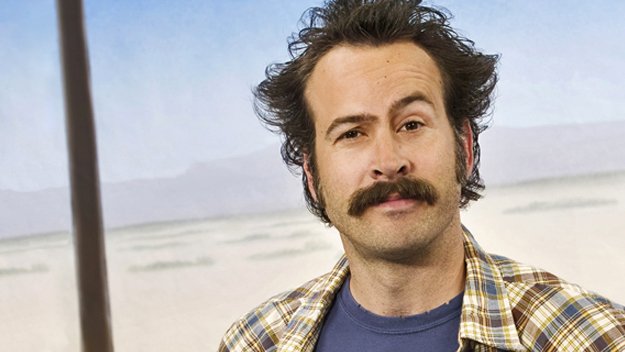“I know you believe in that Bible adage ‘you reap what you sow’,” said my brother.
“Yes. Why, yes, I do.” I said this, ready for his ‘but’ to come. Because I know what Neil was thinking. We’ve touched on this before. Everyone has to reconcile this kind of thought process with the obvious reality that bad things happen to good people. And good things happen to bad people. Which seems to negate the whole reaping and sowing thing.
“You ever watched that show My Name Is Earl?” I ask. “You know your mother loves it.” I want to introduce karma into our conversation.
The main character of the show ‘My Name is Earl’ is Earl. In was one of those casting moments of perfection, Jason Lee, a professional skateboarder in real or at least earlier life, owns the title role. He is endearing. He’s sexy in that skateboarder kind of slouchy yet graceful way, with wild hair, a quirky eyebrow, and a very manly mustache. There is a natural acceptance of life in his attitude that screams zen-ness. Earl, is the kind of guy “who does nothing but bad things and then wonders why his life sucks?” Every time something good happened to him, something bad was always waiting around the corner. He realizes its karma. (In the show, this epiphany happens when he wins the lottery and immediately gets hit by a truck, the winning ticket flying out of his hand, dispersed by the wind.) So Earl makes a list of everything bad he’s ever done and one by one, begins making up for all his mistakes. He decides to be a better person. He’s mollifying karma.
Neil is ruminating his next question and I am googling karma.
Karma refers to the spiritual principle of cause and effect where intent and
actions of an individual (cause) influence the future of that individual (effect).
Good intent and good deed contribute to good karma and future happiness, while
bad intent and bad deed contribute to bad karma and future suffering. Wikipedia.
Southern Christian Bible belters aren’t really used to aligning themselves theologically with Buddhists, so generally we’d probably be loathe to say we believe in karma. But at this point I don’t know how you could logically get around that the reaping and sowing of scripture like Galatians 6:7 (Do not be deceived: God cannot be mocked. A man reaps what he sows) and karma aren’t part of our understanding of the spiritual principle, no matter what you call it.
“There are limitations though.
“Tell me what you are thinking, Jan,” Neil says.
“Well, I do believe that we as individuals are responsible for the way we conduct ourselves. And I think it’s wholly true that it matters for how our lives work out. I think by the very nature of choosing honesty or kindness or joy as the default methodology we use in our daily activities, you reap, in kind, those characteristics from others. And if you are bitter, complaining, dishonest, prone to thievery and lying, you will likely be on the receiving end of those ‘attributes’ in your life.”
I look at him.
‘I know. I know. It has nothing to do with guarantees nor does it explain what some might call ‘luck’.
(It only take a few seconds, Wikipedia defines luck as success or failure apparently brought by chance rather than through one’s own actions.)
No matter what any of us do we are going to be the recipient of bad and good things of which we have no control.
“If karma is a spiritual principle, its not the only one. I believe in good and evil. As real things. Like laws of the universe, equal to the laws of physics but in a different realm.” I am thinking this through as I say it. “Luck or sin or evil.. there is something more at work in our lives that is out of our control. At least that’s the way it looks at this point in human history.”
It strikes me that Buddhists have noticed this and tried to deal with it. Extending the idea of karma, Buddhist philosophy allows for a reckoning of your good deeds in the next life. You have the prospect of coming back in a better one. Or a worse one.
Christians look at it completely differently.
It’s the reason for Christ. Which I have been ruminating on for months. I hope Neil and I get to this. I want to run some things past him. Before I can, he asks something else.
“Do you believe in prosperity gospel?” he says.
Prosperity gospel, a weird incorrect brand of Christianity that purports if you have enough faith God will give you anything you want. Think Joel Osteen. Basically God is a fairy God mother who, if you believe hard enough, grants you everything you desire. This usually centers around materialistic desires. This is VERY seductive to many people.
“Lord no,” I tell him. “There is nothing that supports that!” (By this I mean empirical evidence). By the way, prosperity preachers get out of this particular theological failure by blaming your lack of faith as the reason your dreams and wishes aren’t coming true. Believe harder!
I continue. “Scripture is wholly honest about this. In fact the New Testament testifies that is precisely not the case! The scripture of the New Testament actually lays out exactly the argument and observations you and I are wondering about. It explains the problem and gives the solution.”
So now we will get to this because I want to tell Neil about two things. The first happened several months ago in a theological conference I was attending. Biblical scholars were debating the very reality of good and evil and one of them, a man with lots of education and willingness to think, said what anyone who is considering Christianity should ask.
He said this: “This whole idea of sacrifice to atone for sins is weird, especially when the ultimate sacrifice appears to have required that God give his only son who had never done anything wrong. If God is who He says he is, why didn’t he just forgive us of our sins. Why sacrifice your son? It seems cruel and unfair if He is a just and loving God.”
He went on.
“The only thing I can come up with is that there is something about evil and sin that cannot be undone without sacrifice.”
You see what he is getting at right? Those words hold a lot to think about. Think of it in terms of destruction. If you a bomb blows up a house, forgiving the bomb doesn’t fix the house. Something has to actually be done to the house to repair the damage. His train of thought puts good and evil as entities way more substantive.
“I’ve come to think about evil and sin like that, Neil.” I say after he’s heard me through. “That’s why I think evil is a real thing. A very real thing. I believe in gravity. And I believe in evil. And all of this is made worse by the fact that from the beginning of mankind, while we know what is good and right innately, we sin, we often choose sin, and evil, however we can think of that, moves about this earth often incorporating us in it’s harmful plans.”
“What made you think about karma?” Neil says.
“Well. That was Mark Lanier and Bono in Sunday School last week.
“Really.”
“Yep.”
“It’s a mind-blowing concept that the God who created the Universe might be looking for company, a real relationship with people, but the thing that keeps me on my knees is the difference between Grace and Karma…
You see, at the centre of all religions is the idea of Karma. You know, what you put out comes back to you; an eye for an eye, a tooth for a tooth, or in physics – in physical laws – every action is met by an equal or opposite one. Its clear to me that Karma is at the very heart of the universe. I’m absolutely sure of it.
And yet, along comes this idea called Grace to upend all that “As you reap, so will you sow” stuff. Grace defies reason and logic. Love interrupts, if you like, the consequences of your actions, which in my case is very good news indeed, because I’ve done a lot of stupid stuff.
That’s between me and God. But I’d be in big trouble if Karma was going to finally be my judge. I’d be in deep shit. It doesn’t excuse my mistakes, but I’m holding out for Grace. I’m holding out that Jesus took my sins onto the Cross because I know who I am, and I hope I don’t have to depend on my own religiosity.
The point of the death of Christ is that Christ took on the sins of the world so that what we put out did not come back to us, and that our sinful nature does not reap the obvious death. That’s the point. It should keep us humbled….its not our own good works that get through the gates of heaven…
If only we could be a bit more like Him, the world would be transformed. All I do is get up on the Cross of the Ego; the bad hangover, the bad review. When I look at the Cross of Christ, what I see up there is all my shit and everybody else’s. So I ask myself a question a lot of people have asked: Who is this man? And was He who He said He was, or was he just a religious nut? And there it is, and that’s the question. And no one can talk you into it or out of it.” All text taken from Chapter 11 of Bono on Bono: conversations with Michka Assayas, 2005 (Hodder).
“And Neil,?” I say.
“Yes, Jan?”
“Here’s what I believe. It’s good to reap and sow. But the only way to make sense of life is to believe that their is evil. But along with that, in the bigger plan, and the place where hope and truth lies, is love. It is the perfect love that brings grace that matters. And it’s God’s perfect love that wins.”







One Response
Evil exists…love and grace make living in Christ’s glow the blessing we can have when we are children of God.
Well said, Janet, well written!